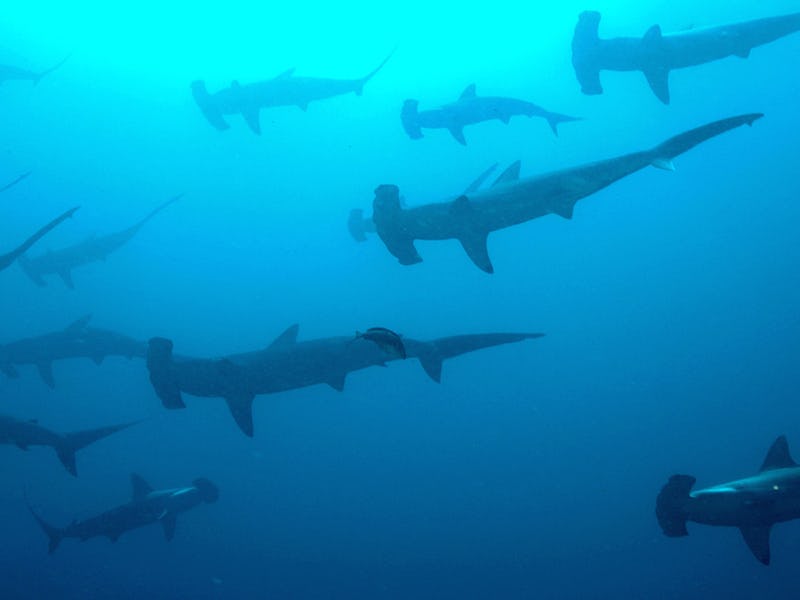How 'Shark Week' Hacks the Biology of Fear
These hammerheads don't want to eat you, but your neurotransmitters don't know that.

Fear does not have a genetic basis — at least as far as scientists can tell. Humans have predispositions, anxieties, phobias, and neural networks equipped to handle the flight response, but we have to learn to fear those animals, people, and motor vehicles that would do us harm. Sharks are not scary until we imbue them with power and motivation, until we internalize Jaws and sit down to watch Discovery Channel’s Shark Week. And, after that, we’re not simply scared by them; they have a pull on us.
To understand why this is the case, you must first imagine a six-month-old baby sitting next to a shark-filled tank. A Mako charges the glass. Does the child duck in terror or squeal in delight? Depends on the kid, but probably the latter. Fearlessness and ignorance and very similar phenomena.
Scientists have known that much for a long time. In the ‘20s, before there were ethical regulations on psychology research, the Baby Albert experiment was designed by researchers curious to see if they could efficiently implant phobias in a child. They attempted to do so by having Baby Albert play with a normal white lab rat, which he was happy enough to do. Then, they started banging a hammer on a piece of steel every time Baby Albert touched the rat, which caused him to cry out in fear. The next stage of the test found that Baby Albert showed fear every time he saw the rat, even if there was no loud sound made. This sadistic twist on Pavlov got interesting when the researchers documented the generalization of Albert’s fears. He wasn’t just scared of rats, he was afraid of all furry things.
Understood through the lens of the Albert experiments, sharks aren’t just sharks. They are snakes and alligators and crocodiles and Komodo Dragons and dinosaurs. They are big teeth on a non-mammalian body and we know to fear them even if they are not — statistically speaking — particular dangerous. We also know, because we’re a bit smarter than a baby, how our bodies will react if we do see them. It’s that extra layer of knowledge that provides an answer to the behavioral questions Shark Week poses: Why do we want to see sharks at all?
“Why do we go on rollercoasters, or why do we jump out of airplanes with a piece of silk on our backs?” asks George Burgess, the Program Director at the Florida Program for Shark Research. “It’s the adrenaline rush.”
Norepinephrine, adrenaline, and dopamine, three of the neurotransmitters released during a human flight response, tickle the brain’s pleasure centers. This is why thrills make some people so happy and others cower in the corner (different brains reuptake dopamine at different rates). Researchers also suggest, stepping back from the chemical explanation, that we enjoy a surge of self-confidence after surviving a terrifying situation — even if that situation is simulated.
What Burgess is quick to point out, however, is that we only really enjoy the rush of Shark Week because we know that we can turn it off. Over the course of evolution, we have at least learned, for the most part, to avoid fear situations where we can actually be harmed.
“Of course, when you’re watching something on TV, ultimately we know it’s not real and it’s not there,” he says. “It’s a vicarious thrill — a safe thrill.”
In other words, the Baby Albert phobia of sharks ingrained in us by popular culture and imagery allows us to squeeze the sweetest juice from our brains using sharks we know to be fake. Shark Week is about conditioning, neurology, and, well, ratings. It works because it factors in how humans work and rewards us for both our innate characteristics and our conditioning.